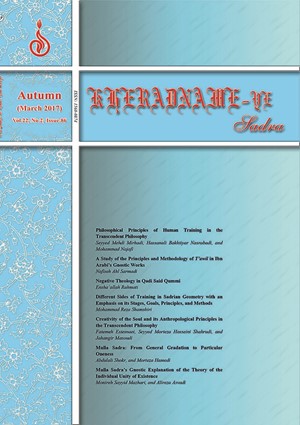-
-
List of Articles
-
Open Access Article
1 - سرمقاله
Seyyed Mohammad Khamenei -
Open Access Article
2 - Philosophical Principles of Human Training in the Transcendent Philosophy
Seyyed Mehdi Mirhadi Hassanali Bakhtiyar Nasrabadi Mohammad Najafi -
Open Access Article
3 - A Study of the Principles and Methodology of T’awil in Ibn Arabi’s Gnostic Works
Nafiseh Ahl Sarmadi -
Open Access Article
4 - Negative Theology in Qadi Said Qummi
Ensha’allah Rahmati -
Open Access Article
5 - Different Sides of Training in Sadrian Geometry with an Emphasis on its Stages, Goals, Principles, and Methods
Mohammad Reza Shamshiri -
Open Access Article
6 - Creativity of the Soul and its Anthropological Principles in the Transcendent Philosophy
Fatemeh Estesnaei Seyyed Morteza Hosseini Shahroudi Jahangir Masoudi -
Open Access Article
7 - Mulla Sadra: From General Gradation to Particular Oneness
Abdolali Shokr Morteza Hamedi -
Open Access Article
8 - Mulla Sadra’s Gnostic Explanation of the Theory of the Individual Unity of Existence
Monireh Sayyid Mazhari
-
The rights to this website are owned by the Raimag Press Management System.
Copyright © 2017-2026







